Comparing Theories of Social Inequality in Sociology
VerifiedAdded on 2023/01/07
|6
|1318
|61
Homework Assignment
AI Summary
This assignment delves into three prominent sociological theories—structural-functionalism, conflict theory, and interactionism—to compare their conceptualizations of social inequalities. Structural-functionalism views inequality as functional and necessary for societal stability, emphasizing meritocracy and the division of labor. Conflict theory, rooted in Marx's ideas, sees society as a site of perpetual struggle for resources, with power dynamics perpetuating inequality. Interactionism focuses on how micro-level interactions maintain structural inequalities, examining the exchange of power and the construction of social roles. The assignment explores the core tenets of each theory, highlighting their contrasting perspectives on the causes, consequences, and perpetuation of social stratification within the context of education and broader society, and how these theories differ in conceptualizing the relationship between educational and social inequalities.
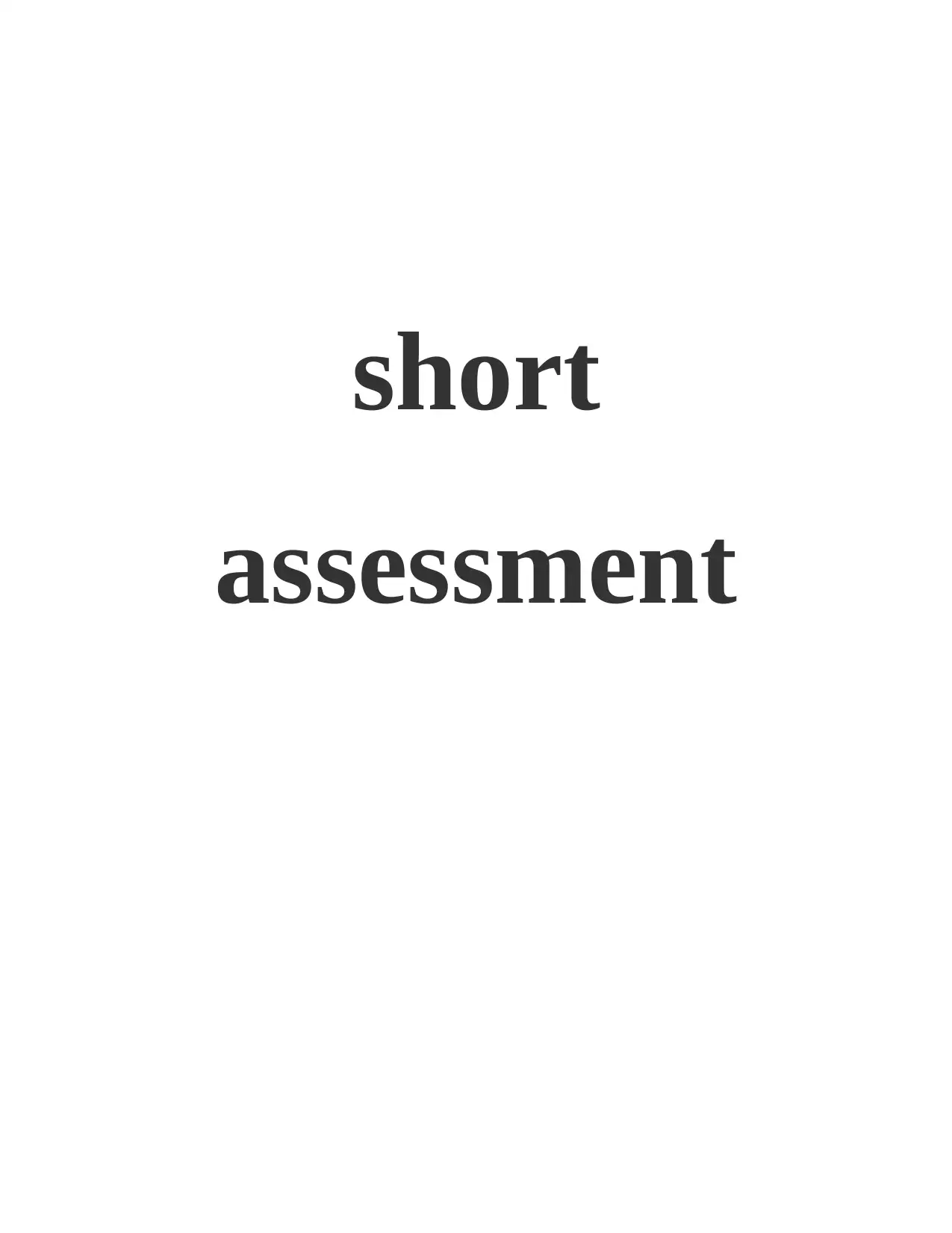
short
assessment
assessment
Paraphrase This Document
Need a fresh take? Get an instant paraphrase of this document with our AI Paraphraser
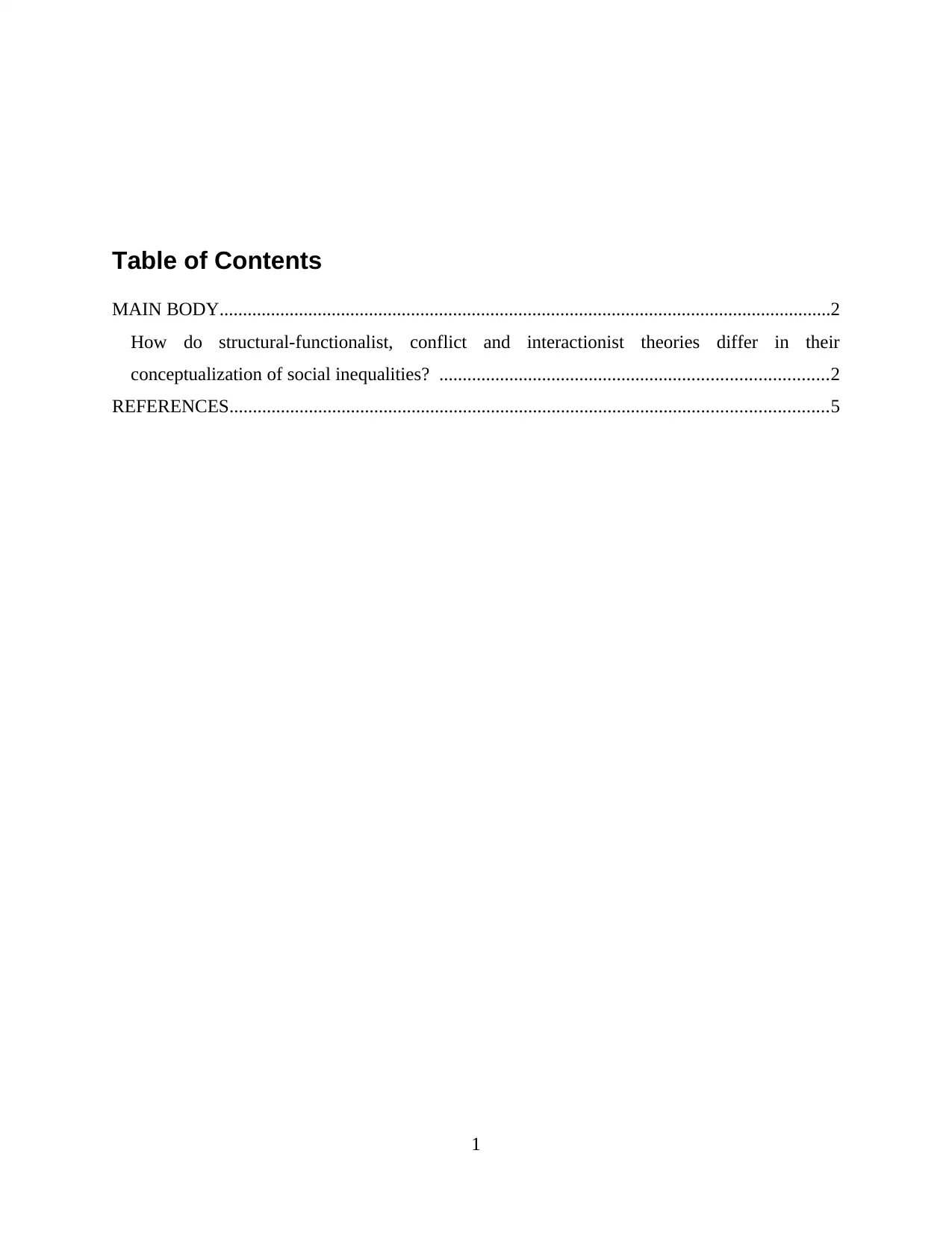
Table of Contents
MAIN BODY...................................................................................................................................2
How do structural-functionalist, conflict and interactionist theories differ in their
conceptualization of social inequalities? ...................................................................................2
REFERENCES................................................................................................................................5
1
MAIN BODY...................................................................................................................................2
How do structural-functionalist, conflict and interactionist theories differ in their
conceptualization of social inequalities? ...................................................................................2
REFERENCES................................................................................................................................5
1
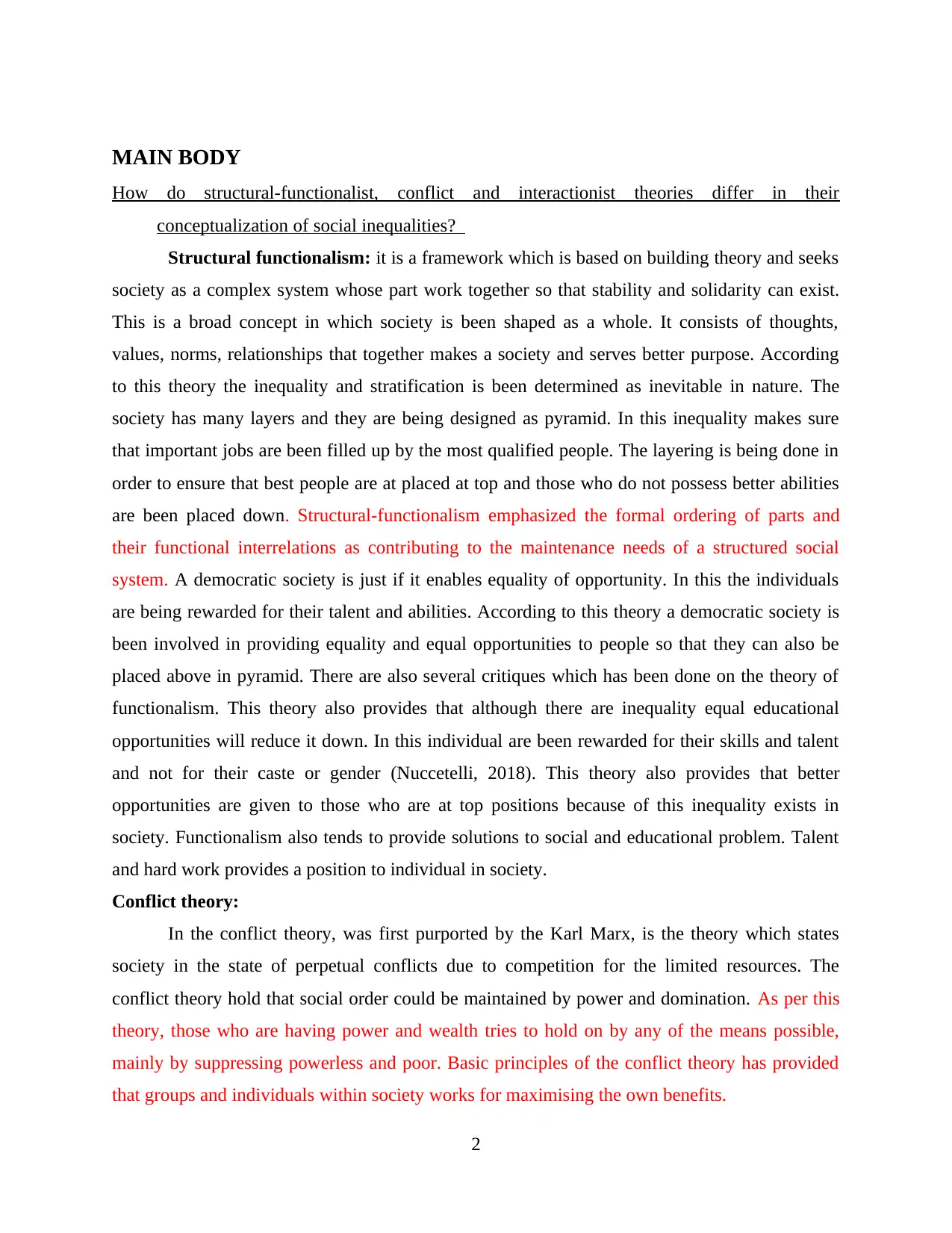
MAIN BODY
How do structural-functionalist, conflict and interactionist theories differ in their
conceptualization of social inequalities?
Structural functionalism: it is a framework which is based on building theory and seeks
society as a complex system whose part work together so that stability and solidarity can exist.
This is a broad concept in which society is been shaped as a whole. It consists of thoughts,
values, norms, relationships that together makes a society and serves better purpose. According
to this theory the inequality and stratification is been determined as inevitable in nature. The
society has many layers and they are being designed as pyramid. In this inequality makes sure
that important jobs are been filled up by the most qualified people. The layering is being done in
order to ensure that best people are at placed at top and those who do not possess better abilities
are been placed down. Structural-functionalism emphasized the formal ordering of parts and
their functional interrelations as contributing to the maintenance needs of a structured social
system. A democratic society is just if it enables equality of opportunity. In this the individuals
are being rewarded for their talent and abilities. According to this theory a democratic society is
been involved in providing equality and equal opportunities to people so that they can also be
placed above in pyramid. There are also several critiques which has been done on the theory of
functionalism. This theory also provides that although there are inequality equal educational
opportunities will reduce it down. In this individual are been rewarded for their skills and talent
and not for their caste or gender (Nuccetelli, 2018). This theory also provides that better
opportunities are given to those who are at top positions because of this inequality exists in
society. Functionalism also tends to provide solutions to social and educational problem. Talent
and hard work provides a position to individual in society.
Conflict theory:
In the conflict theory, was first purported by the Karl Marx, is the theory which states
society in the state of perpetual conflicts due to competition for the limited resources. The
conflict theory hold that social order could be maintained by power and domination. As per this
theory, those who are having power and wealth tries to hold on by any of the means possible,
mainly by suppressing powerless and poor. Basic principles of the conflict theory has provided
that groups and individuals within society works for maximising the own benefits.
2
How do structural-functionalist, conflict and interactionist theories differ in their
conceptualization of social inequalities?
Structural functionalism: it is a framework which is based on building theory and seeks
society as a complex system whose part work together so that stability and solidarity can exist.
This is a broad concept in which society is been shaped as a whole. It consists of thoughts,
values, norms, relationships that together makes a society and serves better purpose. According
to this theory the inequality and stratification is been determined as inevitable in nature. The
society has many layers and they are being designed as pyramid. In this inequality makes sure
that important jobs are been filled up by the most qualified people. The layering is being done in
order to ensure that best people are at placed at top and those who do not possess better abilities
are been placed down. Structural-functionalism emphasized the formal ordering of parts and
their functional interrelations as contributing to the maintenance needs of a structured social
system. A democratic society is just if it enables equality of opportunity. In this the individuals
are being rewarded for their talent and abilities. According to this theory a democratic society is
been involved in providing equality and equal opportunities to people so that they can also be
placed above in pyramid. There are also several critiques which has been done on the theory of
functionalism. This theory also provides that although there are inequality equal educational
opportunities will reduce it down. In this individual are been rewarded for their skills and talent
and not for their caste or gender (Nuccetelli, 2018). This theory also provides that better
opportunities are given to those who are at top positions because of this inequality exists in
society. Functionalism also tends to provide solutions to social and educational problem. Talent
and hard work provides a position to individual in society.
Conflict theory:
In the conflict theory, was first purported by the Karl Marx, is the theory which states
society in the state of perpetual conflicts due to competition for the limited resources. The
conflict theory hold that social order could be maintained by power and domination. As per this
theory, those who are having power and wealth tries to hold on by any of the means possible,
mainly by suppressing powerless and poor. Basic principles of the conflict theory has provided
that groups and individuals within society works for maximising the own benefits.
2
⊘ This is a preview!⊘
Do you want full access?
Subscribe today to unlock all pages.

Trusted by 1+ million students worldwide
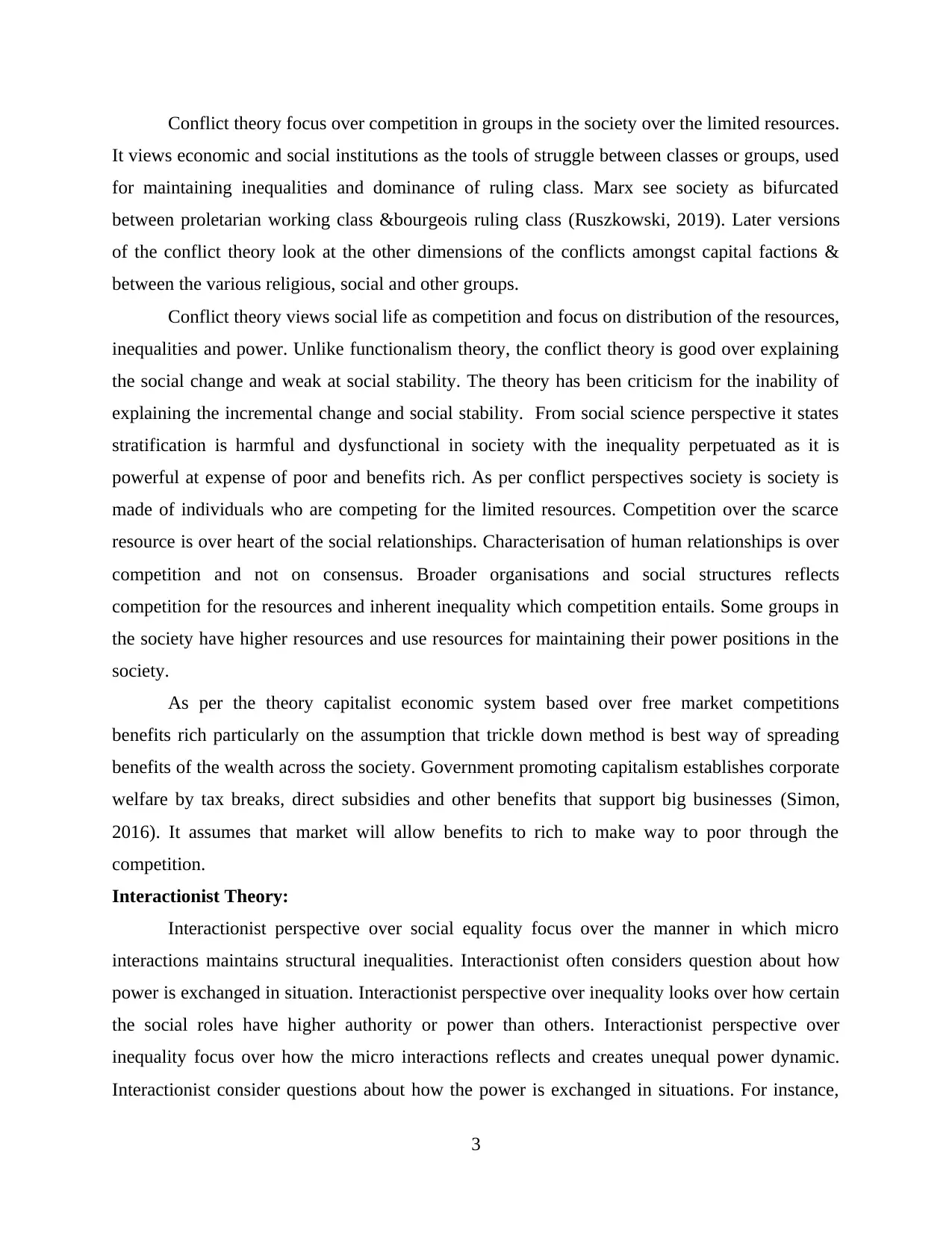
Conflict theory focus over competition in groups in the society over the limited resources.
It views economic and social institutions as the tools of struggle between classes or groups, used
for maintaining inequalities and dominance of ruling class. Marx see society as bifurcated
between proletarian working class &bourgeois ruling class (Ruszkowski, 2019). Later versions
of the conflict theory look at the other dimensions of the conflicts amongst capital factions &
between the various religious, social and other groups.
Conflict theory views social life as competition and focus on distribution of the resources,
inequalities and power. Unlike functionalism theory, the conflict theory is good over explaining
the social change and weak at social stability. The theory has been criticism for the inability of
explaining the incremental change and social stability. From social science perspective it states
stratification is harmful and dysfunctional in society with the inequality perpetuated as it is
powerful at expense of poor and benefits rich. As per conflict perspectives society is society is
made of individuals who are competing for the limited resources. Competition over the scarce
resource is over heart of the social relationships. Characterisation of human relationships is over
competition and not on consensus. Broader organisations and social structures reflects
competition for the resources and inherent inequality which competition entails. Some groups in
the society have higher resources and use resources for maintaining their power positions in the
society.
As per the theory capitalist economic system based over free market competitions
benefits rich particularly on the assumption that trickle down method is best way of spreading
benefits of the wealth across the society. Government promoting capitalism establishes corporate
welfare by tax breaks, direct subsidies and other benefits that support big businesses (Simon,
2016). It assumes that market will allow benefits to rich to make way to poor through the
competition.
Interactionist Theory:
Interactionist perspective over social equality focus over the manner in which micro
interactions maintains structural inequalities. Interactionist often considers question about how
power is exchanged in situation. Interactionist perspective over inequality looks over how certain
the social roles have higher authority or power than others. Interactionist perspective over
inequality focus over how the micro interactions reflects and creates unequal power dynamic.
Interactionist consider questions about how the power is exchanged in situations. For instance,
3
It views economic and social institutions as the tools of struggle between classes or groups, used
for maintaining inequalities and dominance of ruling class. Marx see society as bifurcated
between proletarian working class &bourgeois ruling class (Ruszkowski, 2019). Later versions
of the conflict theory look at the other dimensions of the conflicts amongst capital factions &
between the various religious, social and other groups.
Conflict theory views social life as competition and focus on distribution of the resources,
inequalities and power. Unlike functionalism theory, the conflict theory is good over explaining
the social change and weak at social stability. The theory has been criticism for the inability of
explaining the incremental change and social stability. From social science perspective it states
stratification is harmful and dysfunctional in society with the inequality perpetuated as it is
powerful at expense of poor and benefits rich. As per conflict perspectives society is society is
made of individuals who are competing for the limited resources. Competition over the scarce
resource is over heart of the social relationships. Characterisation of human relationships is over
competition and not on consensus. Broader organisations and social structures reflects
competition for the resources and inherent inequality which competition entails. Some groups in
the society have higher resources and use resources for maintaining their power positions in the
society.
As per the theory capitalist economic system based over free market competitions
benefits rich particularly on the assumption that trickle down method is best way of spreading
benefits of the wealth across the society. Government promoting capitalism establishes corporate
welfare by tax breaks, direct subsidies and other benefits that support big businesses (Simon,
2016). It assumes that market will allow benefits to rich to make way to poor through the
competition.
Interactionist Theory:
Interactionist perspective over social equality focus over the manner in which micro
interactions maintains structural inequalities. Interactionist often considers question about how
power is exchanged in situation. Interactionist perspective over inequality looks over how certain
the social roles have higher authority or power than others. Interactionist perspective over
inequality focus over how the micro interactions reflects and creates unequal power dynamic.
Interactionist consider questions about how the power is exchanged in situations. For instance,
3
Paraphrase This Document
Need a fresh take? Get an instant paraphrase of this document with our AI Paraphraser
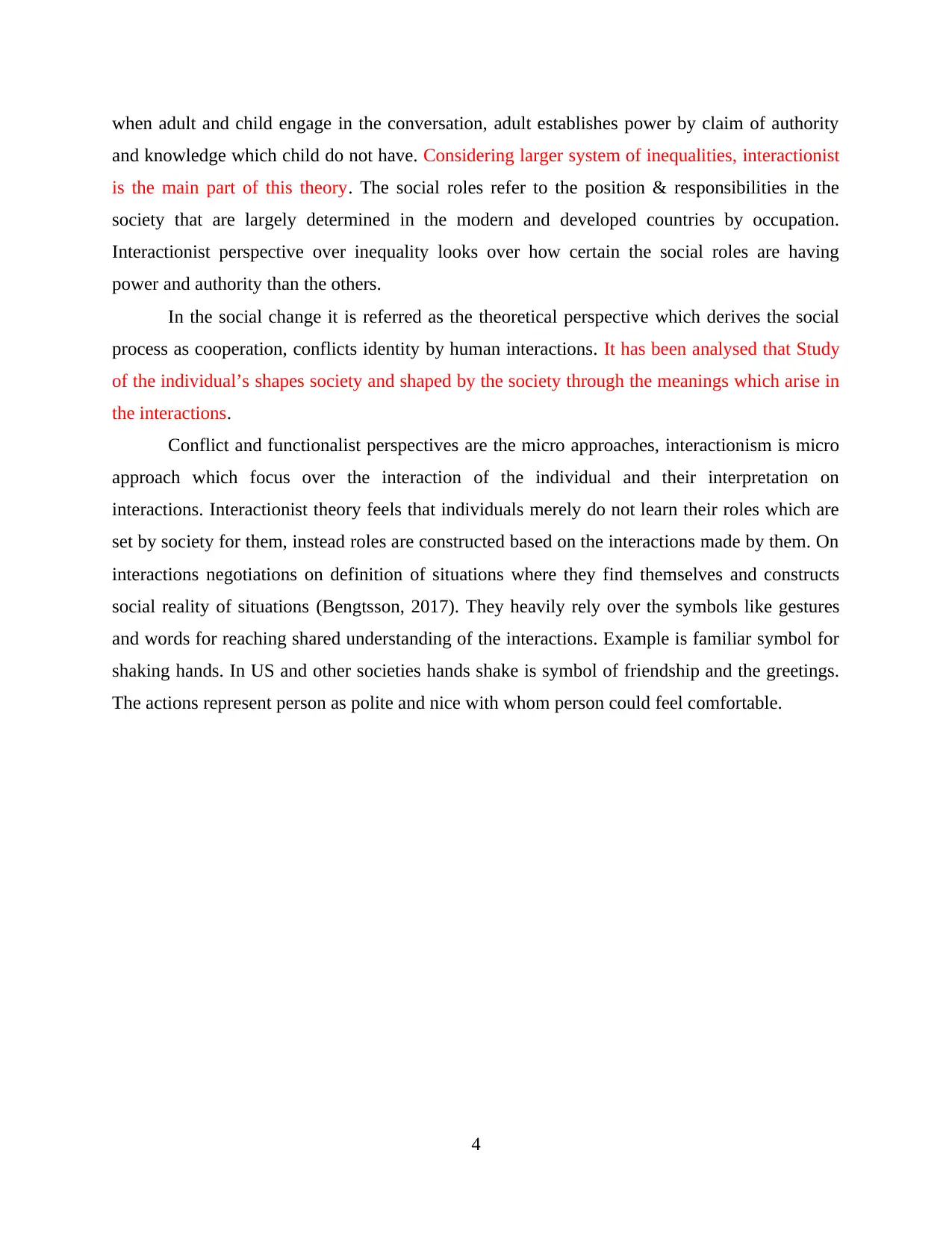
when adult and child engage in the conversation, adult establishes power by claim of authority
and knowledge which child do not have. Considering larger system of inequalities, interactionist
is the main part of this theory. The social roles refer to the position & responsibilities in the
society that are largely determined in the modern and developed countries by occupation.
Interactionist perspective over inequality looks over how certain the social roles are having
power and authority than the others.
In the social change it is referred as the theoretical perspective which derives the social
process as cooperation, conflicts identity by human interactions. It has been analysed that Study
of the individual’s shapes society and shaped by the society through the meanings which arise in
the interactions.
Conflict and functionalist perspectives are the micro approaches, interactionism is micro
approach which focus over the interaction of the individual and their interpretation on
interactions. Interactionist theory feels that individuals merely do not learn their roles which are
set by society for them, instead roles are constructed based on the interactions made by them. On
interactions negotiations on definition of situations where they find themselves and constructs
social reality of situations (Bengtsson, 2017). They heavily rely over the symbols like gestures
and words for reaching shared understanding of the interactions. Example is familiar symbol for
shaking hands. In US and other societies hands shake is symbol of friendship and the greetings.
The actions represent person as polite and nice with whom person could feel comfortable.
4
and knowledge which child do not have. Considering larger system of inequalities, interactionist
is the main part of this theory. The social roles refer to the position & responsibilities in the
society that are largely determined in the modern and developed countries by occupation.
Interactionist perspective over inequality looks over how certain the social roles are having
power and authority than the others.
In the social change it is referred as the theoretical perspective which derives the social
process as cooperation, conflicts identity by human interactions. It has been analysed that Study
of the individual’s shapes society and shaped by the society through the meanings which arise in
the interactions.
Conflict and functionalist perspectives are the micro approaches, interactionism is micro
approach which focus over the interaction of the individual and their interpretation on
interactions. Interactionist theory feels that individuals merely do not learn their roles which are
set by society for them, instead roles are constructed based on the interactions made by them. On
interactions negotiations on definition of situations where they find themselves and constructs
social reality of situations (Bengtsson, 2017). They heavily rely over the symbols like gestures
and words for reaching shared understanding of the interactions. Example is familiar symbol for
shaking hands. In US and other societies hands shake is symbol of friendship and the greetings.
The actions represent person as polite and nice with whom person could feel comfortable.
4
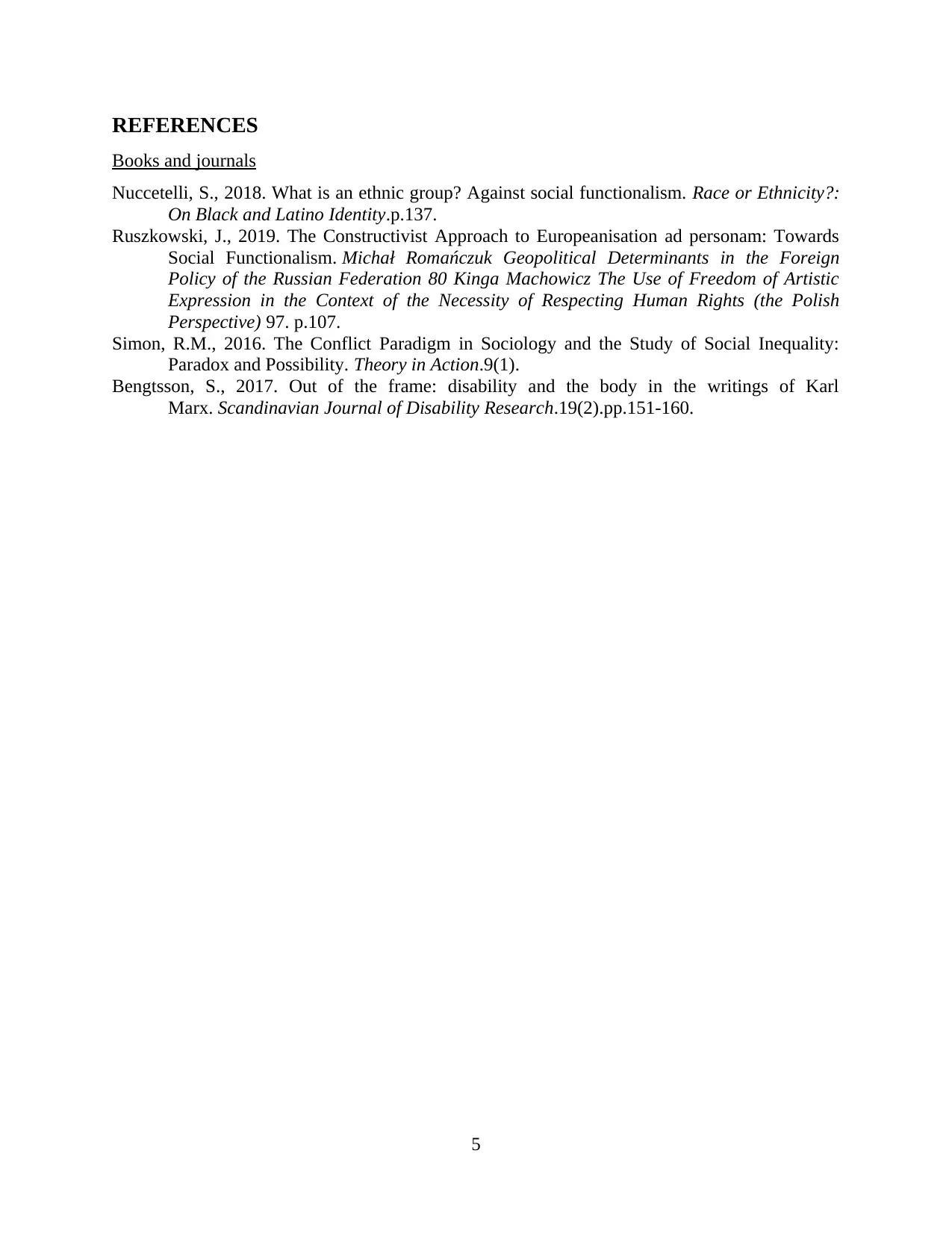
REFERENCES
Books and journals
Nuccetelli, S., 2018. What is an ethnic group? Against social functionalism. Race or Ethnicity?:
On Black and Latino Identity.p.137.
Ruszkowski, J., 2019. The Constructivist Approach to Europeanisation ad personam: Towards
Social Functionalism. Michał Romańczuk Geopolitical Determinants in the Foreign
Policy of the Russian Federation 80 Kinga Machowicz The Use of Freedom of Artistic
Expression in the Context of the Necessity of Respecting Human Rights (the Polish
Perspective) 97. p.107.
Simon, R.M., 2016. The Conflict Paradigm in Sociology and the Study of Social Inequality:
Paradox and Possibility. Theory in Action.9(1).
Bengtsson, S., 2017. Out of the frame: disability and the body in the writings of Karl
Marx. Scandinavian Journal of Disability Research.19(2).pp.151-160.
5
Books and journals
Nuccetelli, S., 2018. What is an ethnic group? Against social functionalism. Race or Ethnicity?:
On Black and Latino Identity.p.137.
Ruszkowski, J., 2019. The Constructivist Approach to Europeanisation ad personam: Towards
Social Functionalism. Michał Romańczuk Geopolitical Determinants in the Foreign
Policy of the Russian Federation 80 Kinga Machowicz The Use of Freedom of Artistic
Expression in the Context of the Necessity of Respecting Human Rights (the Polish
Perspective) 97. p.107.
Simon, R.M., 2016. The Conflict Paradigm in Sociology and the Study of Social Inequality:
Paradox and Possibility. Theory in Action.9(1).
Bengtsson, S., 2017. Out of the frame: disability and the body in the writings of Karl
Marx. Scandinavian Journal of Disability Research.19(2).pp.151-160.
5
⊘ This is a preview!⊘
Do you want full access?
Subscribe today to unlock all pages.

Trusted by 1+ million students worldwide
1 out of 6
Related Documents
Your All-in-One AI-Powered Toolkit for Academic Success.
+13062052269
info@desklib.com
Available 24*7 on WhatsApp / Email
![[object Object]](/_next/static/media/star-bottom.7253800d.svg)
Unlock your academic potential
Copyright © 2020–2026 A2Z Services. All Rights Reserved. Developed and managed by ZUCOL.




